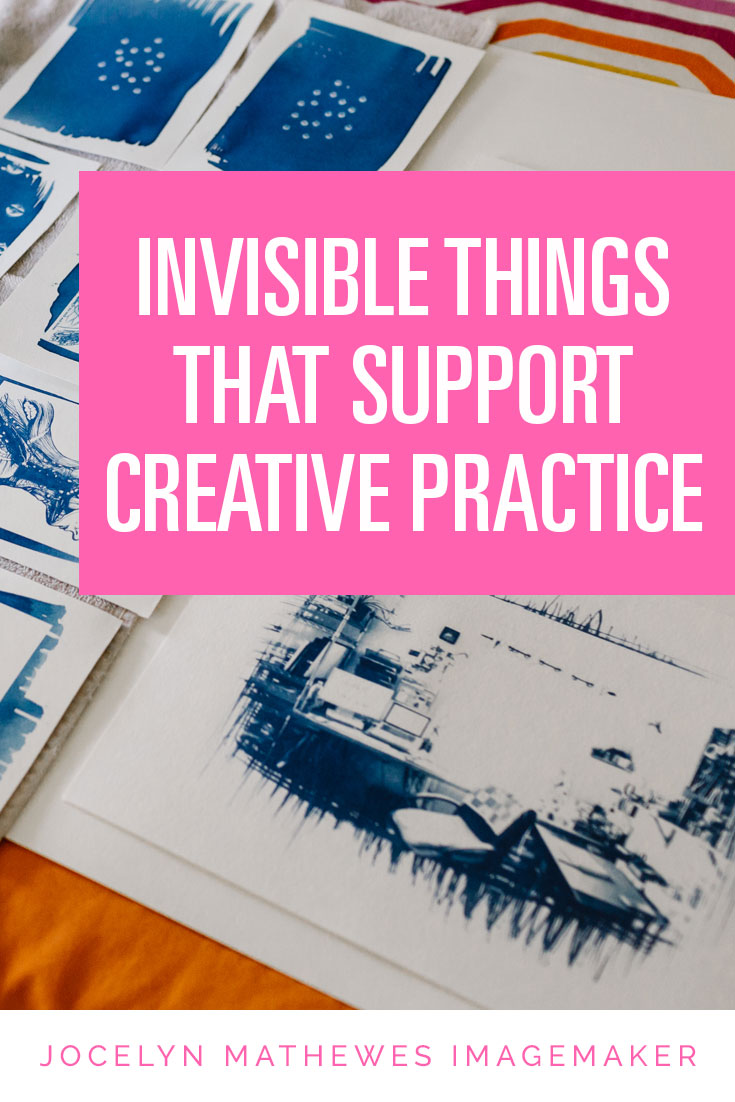It's often said that comparison is the thief of joy. When social media presents us with everyone else's highlights reel, it becomes the veritable black hole for our joy--none of it can escape that giant hungry beast, it seems.
But a good photographer (and I'd like to think I'm at least a decent one) knows that what's left out of the picture is just as important as what's in the picture. By editing things out, you can create a clearer and more communicative set of elements. What you leave out is present through its absence, and you can see what people choose to value through what they choose to emphasize. Good editing helps tell a good story, but it always leaves something out.
When it comes to sharing my life on social media, there are certain things that I consider off-limits. But I value transparency when talking about my art career, because clearly examining the circumstances, privileges, and support that one receives (or does not receive) means that you understand more clearly where you’re coming from, what is within your control, and what you can achieve with it. It allows you to see the advantages (or disadvantages) that others have.
So, I took the time to compile a list of invisible things that make my work possible:
- my husband's salary (enough for us to get by on in our area)
- childcare, paid (it’s available, and we can afford some)
- childcare, free (thanks, mom & dad)
- a home studio space (a luxury for most, although mine is also my bedroom)
- emotional support (immensely wonderful and good soul-food)
- professional & personal networks (there are other artists nearby)
- respect from friends & family (they help me make time & appreciate my work)
- routines & stability (we’re fairly settled down)
- good health (comes and goes, but overall I function at a higher level that some)
WHY NO ONE TALKS ABOUT THESE THINGS
Perhaps we're embarrassed to talk about the differences we have in our life circumstances because they can feel so personal. Perhaps they reveal an privileged or unearned advantage that one person has over another. What lies underneath all of the things I listed above are a whole host of social issues that aren't easy to talk about online.
But I wish more people talked more clearly about these things, because then we'd be getting to the meat of the matter. I wish more people were honest about the kinds of sacrifices they made to create their life--both positive and painful. That way, when we look at the life someone else has built, we're less likely to get caught in the jealousy trap.
And of course, there are only so many things over which we have any control. Including things outside our control in the conversation brings us to uncomfortable territory, even up against our own mortality.
But we’re still in danger of comparing here. The point in talking more clearly about these things is not to open up more comparison and jealousy, but to get real clarity about your own situation so that you can see what actions are do-able within your own framework.
IDENTIFYING WHAT'S WITHIN YOUR REALM OF INFLUENCE
For instance, a limitation that I chose (and continue to choose every day), is my relationship with my husband and family. Let’s be frank here: there are plenty of things keeping me in my family—nutured and healthy relationships, for one. But any relationship (family, romantic, or otherwise) is something that you have to prioritize and value in order to maintain. That takes energy. Using my energy to nurture my relationships is a limitation I choose.
One of the limitations outside of my control that I have to deal with is my chronic illness — it shapes the amount of total energy and kinds of activities that I can participate in. It ebbs and flows and has its own seasons that I have to plan for and to which I must adapt. Living with a chronic illness is a limitation that I have not chosen, but that I have to acknowledge in order to live a full life.
Other possible not-chosen limitations and things beyond your control can be: where you live, the market’s need for your goods or services, the weather, your luck, the number of opportunities in your area, the level of competition in your chosen market.
DRESS FOR THE WEATHER
So when there are limitations around (chosen or not), my suggestion is that the best thing you can do is to embrace them, as best you can. You may have to take some time to identify what they are, so that you can best adapt to them.
But whatever you do, you can’t ignore your limitations--that's the same as failing to dress for the weather. If you walk out into the freezing snow without a winter jacket, you're going to make life a lot more difficult for yourself.
In keeping with the climate metaphor, let's talk gardening. To create a garden that flourishes where you are, it's best to use native seeds and plants that will do best in your given set of seasons and conditions.
If you keep trying to plant tropical fruits in the high mountains of the North, you’re in for disappointment and an uphill battle. But if you make use of the evergreens, shrubs, and fruit-bearing bushes that are accustomed to freezing weather, you’ll have a flourishing garden with its own character and beauty.
None of this gets done without persistence, either. Navigating your limitations can yield clarity of thought and purpose, along with the grit to get up every day and keep doing it. So go on—embrace your limits and cultivate a beautiful life borne out of your own unique microclimate.
